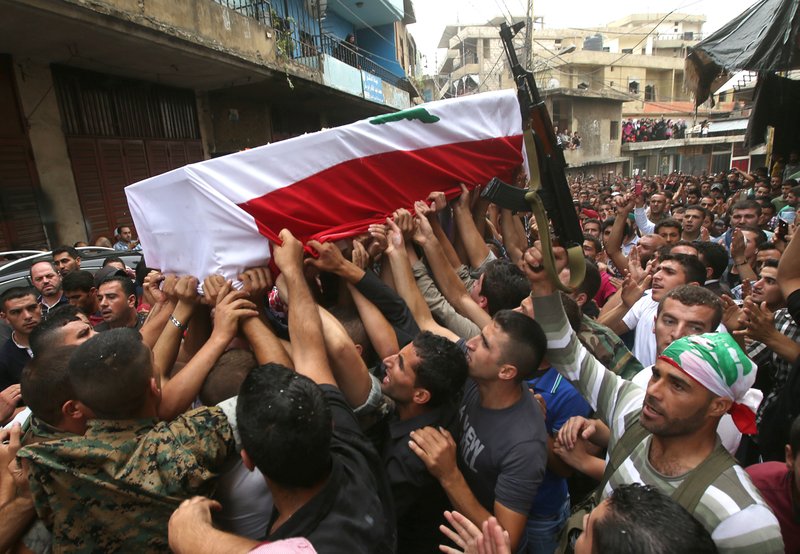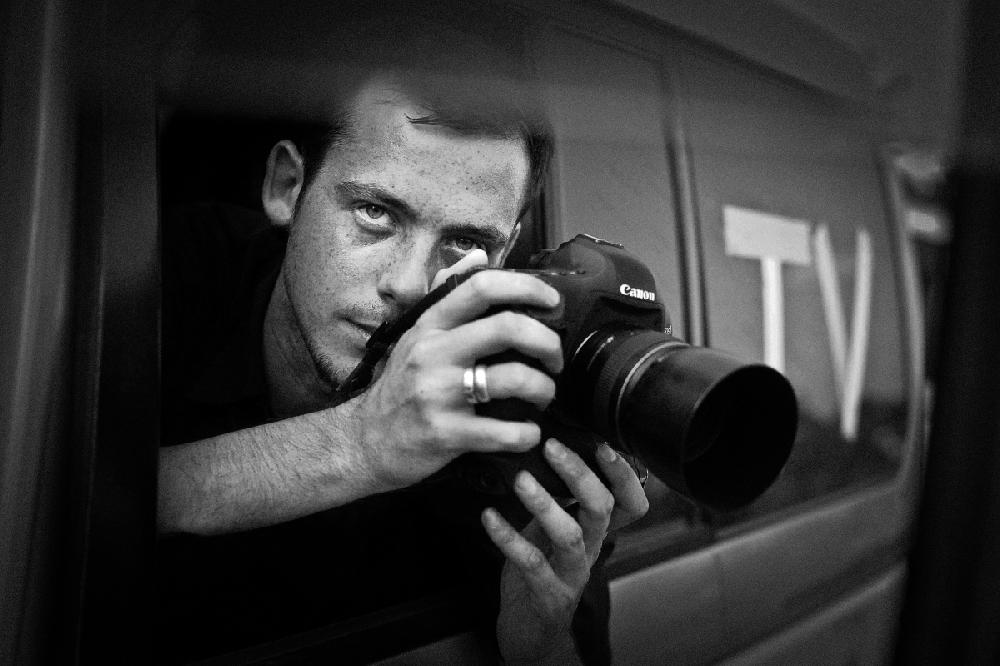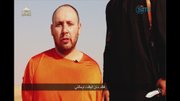TALLINN, Estonia -- President Barack Obama vowed Wednesday to punish the Sunni militants whose videotaped beheadings of two U.S. journalists he said had "repulsed" the world, saying the United States would lead a regional and international coalition to beat back the terrorists.
"Our objective is clear, and that is: degrade and destroy ISIL so that it's no longer a threat, not just to Iraq but also to the region and to the United States," Obama said, using an alternative acronym for the Islamic State extremist group.
He was speaking at a news conference in Estonia on the eve of a NATO summit in Wales, as pressure built for him to articulate a broader military strategy to take on the Islamic State militants, who have declared a self-ruled Islamic state in territories they control in Iraq and Syria.
"It's not only that we're going to be bringing to justice those who perpetrated this terrible crime against these two fine young men," the president said. "The United States will continue to lead a regional and international effort against the kind of barbaric and ultimately empty vision" the group represents.
Obama made Wednesday's statement after drawing criticism from allies and foes for saying last week that he had not yet developed a strategy for confronting the Islamic State in Syria.
He spoke just hours after the White House said intelligence agencies had analyzed a video showing the beheading by an Islamic State fighter of American Steven Sotloff, a 31-year-old freelance journalist, and considered it authentic.
"Whatever these murderers think they will achieve by killing innocent Americans like Steven, they have already failed," Obama said in his first comments on Sotloff's killing since the video was released. "We will not be intimidated. Their horrific acts only unite us as a country and stiffen our resolve to take the fight against these terrorists."
U.S. Secretary of State John Kerry also expressed anger at what he called the "unfathomable brutality" of the militant who killed Sotloff, describing Sotloff as an intrepid journalist "taken from us in an act of medieval savagery by a coward hiding behind a mask."
Kerry said those responsible for the killings of Sotloff and James Foley, a journalist shown beheaded in an Islamic State video released Aug. 19, would be held accountable by the United States, "no matter how long it takes."
Meanwhile, Israel confirmed Wednesday that Sotloff was also an Israeli citizen. His Jewish faith and Israeli citizenship were not widely known before his death. His killers made no mention of Jews or Israel in the footage released Tuesday.
Paul Hirschson, a spokesman for Israel's Foreign Ministry, said on his personal Twitter account that Sotloff held Israeli citizenship. Israel's censor cleared the information for publication Wednesday, suggesting the country had tried to conceal the news to protect Sotloff.
The Sotloff family could not be reached for comment on his citizenship.
Outside his parents' home in the Miami suburb of Pinecrest, family friend Barak Barfi read a statement late Wednesday that said Sotloff was torn between living a normal American life and going to the Middle East's trouble spots as a journalist.
"He was no war junkie. He did not want to be a modern day Lawrence of Arabia," Barfi said. "He merely wanted to give voice to those who had none. From the Libyan doctor in Misrata who struggled to provide psychological services to children ravaged by war, to the Syrian plumber who risked his life by crossing regime lines to purchase medicine, their story was Steve's story. He ultimately sacrificed his life to bring their story to the world."
Push to find militants
The video of Sotloff's death has added to the pressure on the president to order military strikes on the Islamic State in its sanctuary in Syria.
Obama said he was not yet ready to order such action, saying he wanted to be sure that the mission would be effective and that allies at home and abroad supported it.
"It is very important from my perspective that when we send our pilots in to do a job, that we know that this is a mission that's going to work, we're very clear what our objectives are, what our targets are, we've made the case to Congress and we've made the case to the American people, and we have allies behind us," Obama said, "so that it's not just a one-off."
The president said his goal was to ensure that the Islamic State "is not an ongoing threat to the region," and that the group was "degraded to the point where it is no longer the kind of factor that we've seen it being over the last few months."
Obama said that if the United States is joined by the international community, "we can continue to shrink ISIL's sphere of influence, its effectiveness, its financing, its military capabilities to the point where it is a manageable problem."
His remarks, which were made at a joint news conference with President Toomas Hendrik Ilves of Estonia, came at the start of a three-day visit to Europe for a NATO meeting where Obama and European allies were expected to project a strong response to Russia's involvement in fighting in eastern Ukraine.
Confronting the Islamic State group is not on the formal agenda for the NATO meeting, but it is very much an issue expected to be addressed on the sidelines, where Kerry and Defense Secretary Chuck Hagel will be working to enlist help from allies in developing a strategy to counter the militant group.
The U.S. has launched at least 124 airstrikes against the group in Iraq, and on Tuesday, Obama authorized an additional 350 U.S. personnel to fulfill a State Department request to protect diplomatic facilities and personnel in Baghdad.
The White House said the additional forces will not serve in a combat role and will allow some previously deployed military personnel to leave Iraq. Most of the new troops would be used to bolster security at the U.S. Embassy in Baghdad, with a small number reinforcing the U.S. Consulate in Irbil, the capital of the Kurdish region in northern Iraq, according to the Pentagon.
The U.S. said the airstrikes against the Islamic State in Iraq were part of an effort to protect U.S. diplomatic and military personnel in the country and to aid humanitarian efforts.
The president said Wednesday that the airstrikes in Iraq had "borne fruit" by "blunting the momentum" of the militants in that country and averting the humanitarian disasters it had threatened to spark.
Hundreds slain at Iraq base
Despite the U.S. moves, the Islamic State has continued to kidnap and brutally kill those who oppose it in an effort to frighten other opponents and recruit new militants to its cause.
The international activist group Human Rights Watch said Wednesday that militants from the group carried out a mass killing of hundreds of Iraqi soldiers captured when the extremists overran a military base north of Baghdad in June.
The militants overran Camp Speicher, an air base that previously served as a U.S. military facility, was one of the worst atrocities perpetrated by the Islamic State group as it seized large areas of northern and western Iraq.
According to Human Rights Watch, new evidence indicates Islamic State fighters killed between 560 and 770 men captured at Camp Speicher, near the city of Tikrit -- a figure several times higher than what was initially reported.
Human Rights Watch said in late June that analysis of photos and satellite images showed that between 160 and 190 men were killed in at least two locations between June 11 and 14.
The group's new report said the revised figure for the slain soldiers was based on analysis of new satellite imagery, militant videos and a survivor's account that confirmed the existence of three more "mass execution sites." The number of victims may well be even higher as more evidence emerges, it said.
"The barbarity of the Islamic State violates the law and grossly offends the conscience," said Peter Bouckaert, emergencies director at Human Rights Watch.
After the militants overran Camp Speicher, the soldiers were listed as missing, prompting their families to stage demonstrations in Baghdad to pressure authorities for word on their sons.
On Tuesday, dozens of angry family members stormed into the parliament in Baghdad's fortified Green Zone after scuffling with security guards. They forced the speaker to call a session Wednesday on the missing soldiers.
At Wednesday's parliament session, the soldiers' families accused authorities of "selling our sons" by ordering many of the soldiers to abandon their posts and leave Camp Speicher in civilian clothes. Once outside the base, hundreds were captured, said Mohammed al-Assi, a representative for the soldiers' families.
Acting Defense Minister Saadoun al-Dulaimi denied any orders were issued to abandon Camp Speicher.
Meanwhile, in Lebanon, which is dealing with spillover violence from neighboring Syria, thousands of angry mourners buried a soldier beheaded by Islamic State militants and accused the government of neglect for failing to negotiate his release.
Sgt. Ali Sayid, 29, and other members of the country's security forces were seized in August when several militant groups, including the Islamic State and Nusra Front, overran a Lebanese border town, killing and kidnapping soldiers and policemen. About two dozen remain captive.
"He was betrayed by all the politicians, all of them! By parliamentarians and officials, and by the country. He was sold for a cheap price!" Sayid's uncle, Ahmad Sayid, shouted during the funeral, in a tearful speech carried on Lebanese television.
Sayid, a Sunni, disappeared when militants from Syria seized the border town of Arsal for several days in August in the most serious spillover yet of the neighboring Syrian civil war.
Sayid surfaced in a video later announcing his defection from the army and his loyalty to the Islamic State, but he may have spoken under duress. Later, another video surfaced of Sayid being decapitated by militants from the Islamic State.
Families have demonstrated throughout Lebanon demanding the release of the other captives, blocking roads and setting up protest tents. The government has been trying to free them, fearing the army's morale may erode as their captivity continues.
Information for this article was contributed by Julie Hirschfeld Davis of The New York Times; by Tia Goldenberg, Julie Pace, Hussein Malla, Sinan Salaheddin, Sameer N. Yacoub and Diaa Hadid of The Associated Press; and by Lesley Clark and James Rosen of McClatchy Newspapers.
A Section on 09/04/2014
26576256





